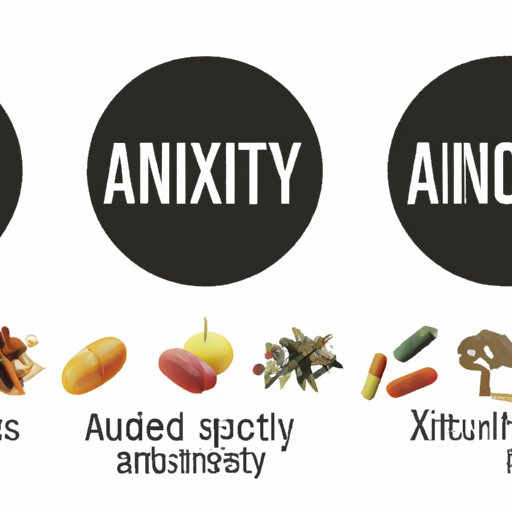
I. Introduction
Anxiety is a feeling of unease, such as worry or fear, that affects our mental and physical health. Everyone experiences anxiety at some point in their lives. However, excessive and constant anxiety can lead to several health problems. Hence, it is necessary to discuss anxiety and develop coping mechanisms to tackle its persistent effects.
II. The Power of Mindfulness
Mindfulness is a form of meditation that involves being present in the moment without judgment. In simple terms, it means being aware of our thoughts, feelings, and surroundings. Practicing mindfulness techniques such as deep breathing, body scan, and meditation can help reduce anxiety and stress levels. Mindfulness has been proven to be effective in reducing anxiety levels in individuals suffering from generalized anxiety disorder and social anxiety.
Deep breathing is an essential technique that can be practiced anywhere, anytime. It involves inhaling slowly through the nose and exhaling through the mouth. Yoga is another mindfulness practice that combines physical movements with controlled breathing and meditation, which can have a calming effect on the nervous system and reduce anxiety levels.
III. The Importance of Sleep
Sleep is an important aspect of maintaining good mental health. A good sleep routine is essential for people with anxiety as a lack of sleep can lead to increased anxiety levels and deteriorating mental health. Maintaining a regular sleep routine involves going to bed and waking up at the same time every day. Establishing a sleep routine can help individuals with anxiety calm their mind and improve their overall quality of life.
It is important to avoid unhealthy habits such as consuming caffeine, alcohol, and nicotine before bedtime, as it can impair sleep. Creating a comfortable sleep environment, such as maintaining a cool temperature in the room, can also promote better sleep quality. Promoting good sleep hygiene is essential for people who struggle with anxiety and have difficulty falling asleep.
IV. Nutrition Therapy
Nutrition plays a significant role in the development and management of anxiety. Consuming a balanced diet can help reduce anxiety symptoms and improve overall health. Foods that are rich in magnesium, vitamin B, and tryptophan can help reduce anxiety levels. Magnesium-rich foods such as almonds, cashews, and spinach can help maintain healthy levels of magnesium in the body, which can reduce anxiety levels.
Similarly, foods that are rich in vitamin B, such as whole grains, nuts, and seeds, can help in elevating mood and reducing anxiety levels. Tryptophan is an amino acid that helps in the production of serotonin, a neurotransmitter that regulates mood, and reduces anxiety levels. Consuming foods such as turkey, eggs, and cheese can help in maintaining healthy levels of tryptophan in the body.
V. Cognitive Behavioral Therapy (CBT)
Cognitive-behavioral therapy (CBT) is a form of therapy that helps individuals identify negative thought patterns and replace them with positive ones. CBT can help individuals cope with anxiety and manage their emotions effectively. It is a practical therapy that involves setting goals and working towards achieving them.
CBT can help individuals suffering from anxiety develop positive coping strategies, such as relaxation techniques, cognitive restructuring, and exposure therapy. Cognitive restructuring involves identifying negative thought patterns and replacing them with positive ones. Exposure therapy involves confronting fearful situations in a gradual and controlled environment. CBT has been shown to be an effective form of therapy in reducing anxiety levels and improving overall mental health.
VI. The Role of Exercise
Exercise is a powerful tool in reducing anxiety and stress levels. Aerobic exercise such as running, cycling, and swimming have been shown to have positive effects on the brain and improve overall mental health. Exercise can also help in releasing endorphins, which are chemicals that reduce pain and promote feelings of happiness.
Individuals suffering from anxiety can benefit from various forms of exercise such as yoga, Pilates, and weight training. These exercises can help in improving physical health, reducing stress levels, and promoting overall wellbeing.
VII. Time Management Strategies
Managing time effectively is essential for individuals suffering from anxiety. Prioritizing tasks, focusing on important tasks, and taking breaks can help in reducing anxiety levels. Setting realistic goals and breaking them down into smaller tasks can help reduce the anxiety associated with overwhelming tasks.
Learning to say ‘no’ and setting boundaries can also help in managing anxiety levels. It is important to allocate time for relaxation and self-care activities to promote overall wellbeing.
VIII. The Benefits of Seeking Professional Help
If anxiety is interfering with daily life, seeking professional help is necessary. A mental health professional can provide effective therapy and cognitive-behavioral techniques to help manage symptoms. Therapy options such as group therapy and medication can help in reducing anxiety levels and improve overall mental health.
It is important to seek help without feeling any shame or embarrassment. Anxiety is a common mental health disorder, and seeking help is a sign of strength and self-care.
IX. Conclusion
Anxiety can be debilitating and impact an individual’s quality of life. However, by incorporating different coping mechanisms and strategies, individuals can overcome anxiety and improve their overall wellbeing. By practicing mindfulness techniques, establishing a good sleep routine, following good nutrition practices, seeking professional help when necessary, and managing time effectively, individuals can better manage their symptoms and lead a happier life.
It is essential to remember that everyone’s experience with anxiety is unique, and finding the right combination of techniques can take time. By combining different strategies and techniques, individuals can overcome anxiety and lead a happy and fulfilling life.




